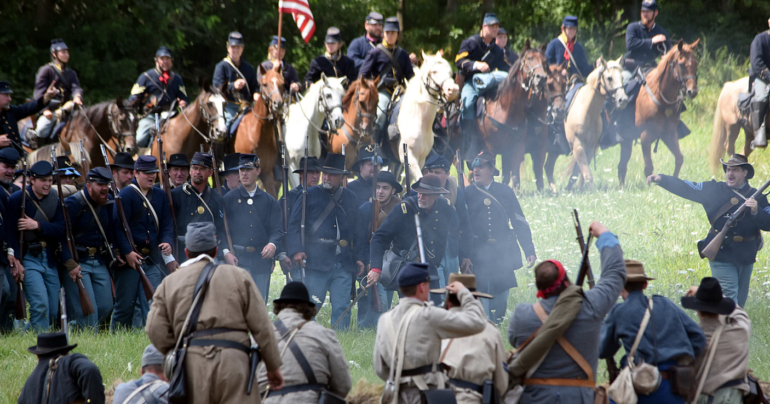
The Ancient Israelites Avoided A Civil War; What They Learned Could Help Us Avoid One Too
As Joe Biden was inaugurated today, there has been a lot of concern about increased tension in the world – between near and distant brothers and sisters – stemming from political disagreements. But of course, arguments between siblings are nothing new. A striking midrash highlights this universal phenomenon with several dramatic dramatic examples: “From the beginning of Creation, brothers have hated each other: Cain hated Abel and killed him…; Ishmael hated Isaac…wanted to kill him…; Esau hated Jacob [and planned to kill him]…; and the tribes hated Joseph [and planned to kill him]…” (Midrash Tanchuma Shemot 24). This excerpt paints a pretty negative picture: as if the worst, most extreme conflicts, among those closest to each other, were built into the very fabric of creation.
Sibling dissent is in fact so prevalent in the Torah’s early stories that some suggest overcoming it is the blessing we offer our children. At the end of his life, Jacob blesses Joseph’s children, Ephraim and Menashe, and says the Jewish people will forever bless their children to be like these two. (Technically, we say this to our sons, not all children; the blessing to daughters is a whole other topic. But the principles are universal.) Why do we want our children to be like Ephraim and Menashe specifically? One answer I’ve heard from multiple sources is that they are the first pair of siblings in the Torah who don’t fight, who are (at least from what we are told) not jealous or resentful of each other – even when Jacob makes a show of raising the younger son above the older in his blessings to them.
Unfortunately, that idyllic picture of Ephraim and Menashe is not always displayed between the tribes that descend from them. The Prophets tell of more than one conflict between the two tribes, including a bloody incident in which 42 thousand Ephraimites die at the hands of their Menashite brethren on the other side of the Jordan River (Judges Chapter 12). At least according to some commentators, tension between them had its roots in early tribal days, when half of Menashe settled on the eastern bank of the Jordan River with the tribes of Reuven and Gad – separating themselves from the rest of their own tribe, from their Ephraimite brethren, and from the majority of their extended family. It is unclear whether the Menashites chose that division; some suggest it was Moshe’s idea and even that his intent was for the divide Menashe to unite those on both sides of the river. Unity maybe have been the goal, but it seems the very natural tendency towards friction with one’s relatives won out, sometimes expressed in conflict between Menashe and Ephraim and sometimes between all the tribes on the two sides.
There were, however, some positive moments in relations between these different segments of the nation. In one case, a conflict that could have ended in disaster instead offers valuable insight into transcending that very natural tendency.
When the tribes of Reuven and Gad first requested the land on the east, Moshe was horrified at the implication that they would settle comfortably while their brethren risked their lives to conquer the Promised Land; they agreed to join the fighting and return to their own land only afterwards. After that tremendous display of unity is complete, comes the moment of division: Joshua reminds them to remain loyal to God, and sends them on their way.
And after their tremendous display of unity is complete, what is the first thing the 2.5 tribes do after taking their leave? “When they came to the region of the Jordan… the children of Reuven and the children of Gad and half the tribe of Menashe build an altar on the Jordan, a great altar to behold” (22:10). At the time, it was forbidden to offer sacrifices anywhere but in the Tabernacle, making this large altar in a completely different location look pretty bad.
When the other tribes hear of it, they gather “to go up against them to war” (v. 12). After all, as they say in a pre-battle plea, they know from experience the potential for God to become angry with the entire nation in response to the sin of one person or group; for their own safety, they cannot allow this treachery against God.
When the stakes are high enough, we can perhaps understand that brothers and sisters would turn on each other. When the actions and (apparent) beliefs of one segment threaten the very lives of the whole, how can they just let that slide? And not only can we understand the fear of the 9.5 tribes, but they don’t seem to harbor real negativity towards the 2.5 tribes – only concern that they are doing the wrong thing. In this particular case of near civil war (spoiler alert: they work out their differences), criticism is delivered together with what appears to be a loving, welcoming offer: If you’re unhappy with the land you chose to settle, “cross over to the land of God’s possession, where the Tabernacle is settled, and take possession among us. Only don’t rebel against God, and don’t rebel against us, by building yourselves an altar other than the altar of our God” (v. 19).
We share a God, they remind their wayward brethren, and we are happy to skootch over and share our land with you too. But don’t betray us.
The 9.5 tribes, significantly referred to throughout this story with the general term “the children of Israel” (as if they, and not the 2.5 tribes, are the true Jews), are certain they are right. They are certain this altar represents a betrayal of God and of them – but they magnanimously offer to welcome the others back, if they will only admit the error of their ways and return.
The thing is, they are wrong. It’s a good thing they took the time to talk before casting stones or worse, because they misunderstood the intent behind that altar.
Remember the description of it: right on the Jordan, the dividing line between the two segments of the population, it was “a great altar to behold.” Turns out, it was only ever intended as something to behold; a monument, not a functional altar. Though it looked really bad, though we can understand the fear of the 9.5 tribes, though we can appreciate their generosity in offering to show the others the error of their ways – what happens next reminds us that even when we think the mistakes of the other side’s viewpoint are abundantly clear, we should perhaps not be so quick to judge.
“God, God, the Lord, God, God, the Lord – He knows, and Israel will know, whether [we built this altar] in rebellion and whether in betrayal of God” (v. 22). There’s a lot of God in that sentence. God knows; people don’t. God knows that even though you think we’re so obviously wrong, even though you think it’s so clear that we’re perpetrating a terrible betrayal of you and of God – actually, it’s the opposite.
They go on to explain that they didn’t intend to bring sacrifices on the altar. Rather, they had a concern: With the Jordan River as a clear physical barrier between them, they were concerned that one day in the future, the 9.5 tribes would come to see the 2.5 tribes as outsiders and would discourage them (perhaps physically) from worshipping God. The altar didn’t represent disunity, but a fear of it; “it is a witness between us and you, and between our generations after us, to serve the service of God before Him, by bringing sacrifices [in the Tabernacle], that your children not say tomorrow to our children, ‘You have no portion in God’” (v. 27). In the same way that perhaps the tribe of Menashe itself was to serve as a link maintaining the unity of the people, by spanning both sides of the Jordan, the monument-altar was intended as a visible reminder that the two banks of the Jordan are connected in service of one God.
That despite their differences, they are one people.
Would the 9.5 tribes have thought to take this sort of approach towards preserving unity? Possibly not. Could there have been another way to eternalize the unity of the 12 tribes? Likely. Should the 2.5 tribes have realized how it might look, and explained themselves upfront rather than taking a unilateral action intended for the good of all but appearing evil? Probably. Communication can always be improved.
But this story reminds us that despite the natural tendency towards tension within immediate and extended families, despite the very real concerns of different perspectives and clashes, despite the very real risk, when people are bound up with each other, that someone’s error of thought or action could endanger the others – there is room to take a step back, to talk, to see things from the other’s perspective and find a way to appreciate shared values even when it seems there are none.
In cases of true danger, it is important to act; fundamentally, the 9.5 tribes were not wrong in confronting up to the others. But war? To actually kill each other, as happened in later horrific episodes? Thank God, at least this time, they talked it out.
Although the midrash we started with sounds incredibly pessimistic, context offers a more positive picture. The passage opens by quoting a verse that seems to idealize the relationship of brothers; “who will make you as a brother to me?” (Song of Songs 8:1) (In the context of this midrash, the speaker is understood to be the people of Israel, and the “you” is “You” – God.) The midrash asks, “Like which brother?!” and proceeds with the list above; the implication is that wishing for someone to be like a brother is misguided, considering what brothers have done to each other since the dawn of time. But the midrash doesn’t end with that list.
Like which brother? Israel said, Like Moshe and Aharon, as it is said, ‘How good and how pleasant, the dwelling of brothers together’ (Psalms 133:1). For they loved each other and held each other dear, for when Moshe took on ‘kingship,’ and Aharon the High Priesthood, they weren’t jealous of each other; rather, each rejoiced in the other’s greatness.
People are different, with different perspectives and approaches and parts to play in the world. It’s easy – natural – to get caught up in those differences, to let jealousy or disagreements about how to achieve certain goals cause real conflict. But resisting those tendencies is not impossible.
When we can recognize a foundation of shared values and love for each other, when we talk and listen rather than casting stones or aspersions, we might find that the other side is not as evil or dangerous as we thought. We might realize we simply have different ideas about how best to reach the same basic goals; we might even, if we can speak to each other with respect, love, and patience, show each other our own perspectives and help balance out the mistakes each side can’t see without hearing from the other.
If you found this content meaningful and want to help further our mission through our Keter, Makom, and Tikun branches, please consider becoming a Change Maker today.







